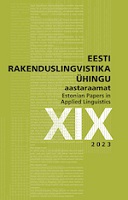Teksti mõistmine lugedes ja kuulates 4. klassi õpilastel
Text comprehension of 4th-grade students by reading and listening
Author(s): Helin Puksand, Kerli Haav, Elika KlettenbergSubject(s): Baltic Languages, School education, Sociology of Education
Published by: Eesti Rakenduslingvistika Ühing (ERÜ)
Keywords: L1 teaching; comprehension; listening skills; reading skills; Estonian;
Summary/Abstract: The modern information society has led to an overabundance of oral and written texts. However, along with technological development, literacy has also changed: in addition to paper books, numerous online materials are used to access information requiring reading, listening, and viewing skills. (Castek 2016: 212) Therefore, understanding diverse texts is important both for coping with social life and for achieving personal goals (OECD 2019: 28). Difficulties in text comprehension can be one of the causes of learning difficulties and academic failure (Cain 2010: 114, Pedaste et al. 2019: 131). To prevent learning difficulties, it is important to develop students’ text comprehension skills equally in listening and reading. The article looks for the answers to whether the 4th-grade students understand the meaning of text more by reading or listening, and if one skill is more or less developed, what is the level of the other skill. The study included 46 students whose text comprehension was tested with listening and reading tasks. The results indicated that 4th-grade students had a better understanding of the information in the listening text. The outcome showed that compared to listening more students got low (less than 50%) test results in reading. The weak readers are not poor listeners. The results showed that poor readers had significantly higher listening test results, some of them had even excellent results. There were few students with poor listening test results, whose reading test results were even lower, indicating they might have more severe learning difficulties. The reading ability of students with good listening skills was not equally good: Half of the students with a high score on the listening test had an average or even low reading score. Good readers had a high or average listening score. This shows that different part-skills do not develop evenly, which is why it is important to deal with all part-skills in school (Kline 1996: 7–8). 4th-grade students have a higher understanding of the listening text, so it would be essential to pay more attention to the teaching of reading strategies. Teachers should remember that a poor reader is not a poor listener. The development of listening skills should not be forgotten in lower secondary school.
Journal: Eesti Rakenduslingvistika Ühingu aastaraamat
- Issue Year: 2023
- Issue No: 19
- Page Range: 159-173
- Page Count: 15
- Language: Estonian

